When you step into a Chinese restaurant, you're often greeted with a steaming pot of tea, enticing you with its aromatic flavors. The tea served at these establishments goes beyond just a simple beverage; it's a cultural experience that complements your meal in a unique way. Each type of tea has its own story to tell, from the delicate floral notes of Jasmine Tea to the bold richness of Pu-erh Tea. So, next time you find yourself at a Chinese restaurant, be sure to explore the diverse world of teas they have to offer – you might just discover a new favorite.
Key Takeaways
- Classic Green Tea is commonly served, offering health benefits and rich antioxidants.
- Oolong Tea with diverse flavors and specific brewing techniques is a popular choice.
- Jasmine Tea, known for its fragrant aroma and antioxidants, is enjoyed with light dishes.
- Pu-erh Tea, served during ceremonies, has a unique earthy flavor and potential health benefits.
- Black Tea, robust in flavor and antioxidants, is a popular choice at Chinese restaurants.
Classic Green Tea
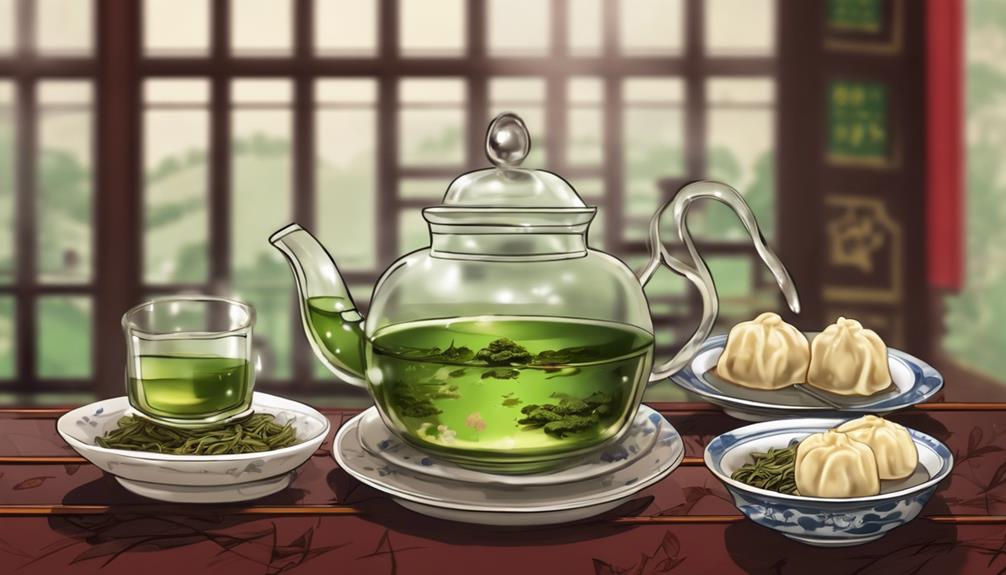
When you visit a Chinese restaurant, you're often greeted with a steaming cup of classic green tea. This traditional beverage not only warms your soul but also offers numerous health benefits.
The brewing techniques for green tea are important to guarantee a perfect cup every time. To brew the ideal cup of green tea, start by heating water to around 175°F, as boiling water can make the tea bitter. Let the tea leaves steep for about 2-3 minutes before enjoying the delicate flavor.
The health benefits of green tea are widely known, ranging from boosting metabolism to improving brain function. Rich in antioxidants, green tea can also help reduce the risk of heart disease and lower blood pressure.
Next time you sip on that comforting cup of green tea at your favorite Chinese restaurant, take a moment to appreciate not only its soothing warmth but also the plethora of health advantages it offers.
Oolong Tea
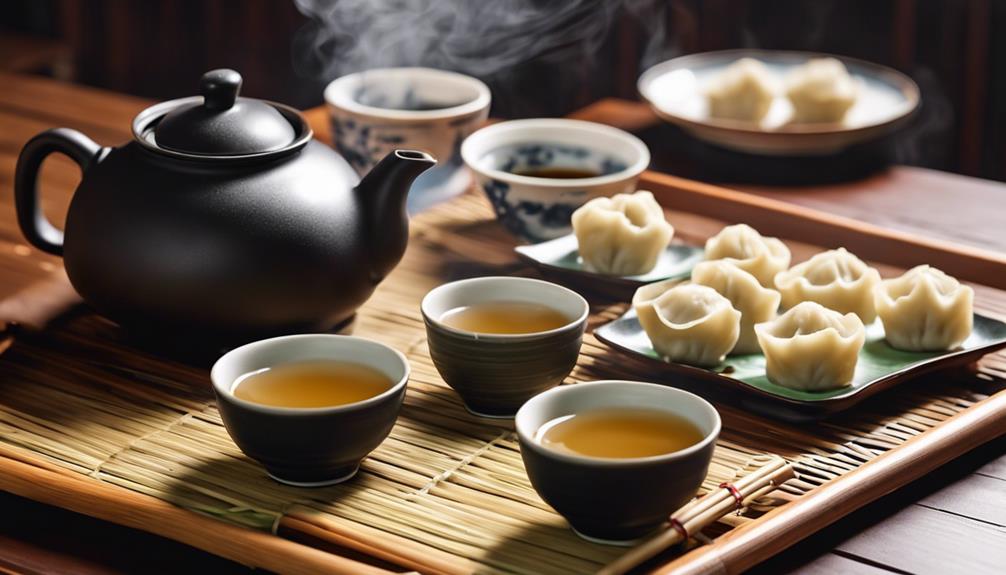
At Chinese restaurants, in addition to classic green tea, you may also find Oolong tea served, offering a unique and flavorful experience. Oolong tea is known for its diverse range of flavors, which can vary from fruity and floral to woody and roasted. This variety in taste comes from the partial oxidation process that Oolong tea undergoes during production.
When it comes to brewing Oolong tea, it's essential to pay attention to the water temperature and steeping time. Oolong tea leaves are delicate and require a delicate touch.
To extract the best flavors, it's recommended to brew Oolong tea at around 190-200°F for 3-5 minutes. However, depending on the specific type of Oolong tea you have, these brewing techniques may vary slightly.
Experimenting with different brewing methods can help you discover the full range of flavors that Oolong tea has to offer. Whether you prefer a light, floral Oolong or a rich, roasted one, there's a flavor profile to suit every palate.
Jasmine Tea
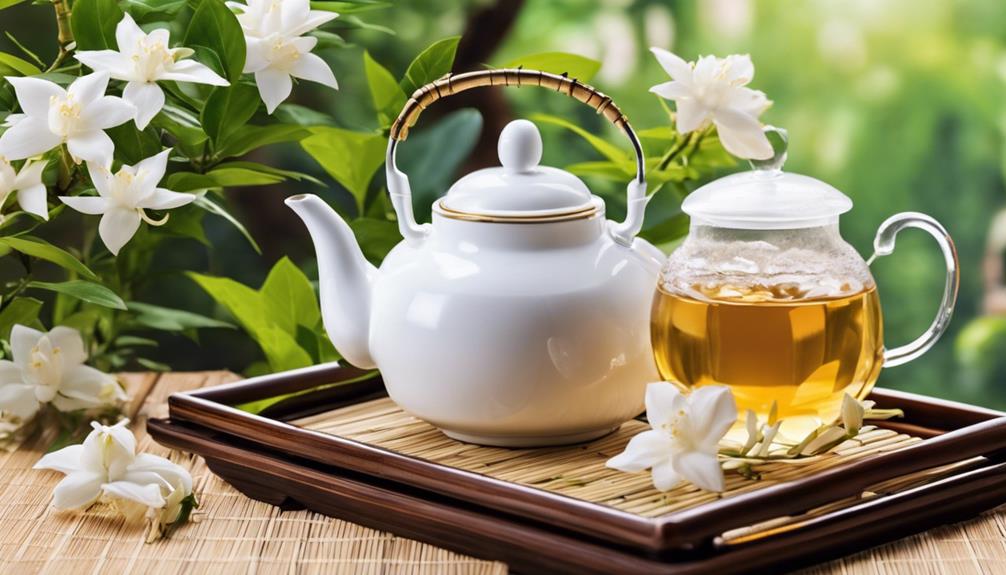
You may find that Jasmine tea, known for its fragrant floral aroma, is a popular choice at Chinese restaurants. This delightful tea offers not only a sensory experience but also various health benefits. Jasmine tea is rich in antioxidants, which can help boost your immune system and improve overall well-being. Some studies suggest that it may also aid in reducing stress and promoting relaxation.
When it comes to brewing techniques, jasmine tea is best brewed with water that's around 176°F (80°C) to avoid a bitter taste. Allow the tea to steep for about 2-4 minutes to achieve a perfect balance of flavors. For a stronger brew, you can increase the steeping time slightly, but be cautious not to overbrew as it may result in a bitter aftertaste.
Jasmine tea is commonly enjoyed on its own or paired with light dishes to complement its delicate floral notes. So, next time you visit a Chinese restaurant, consider indulging in a cup of fragrant jasmine tea for a truly delightful experience.
Pu-erh Tea
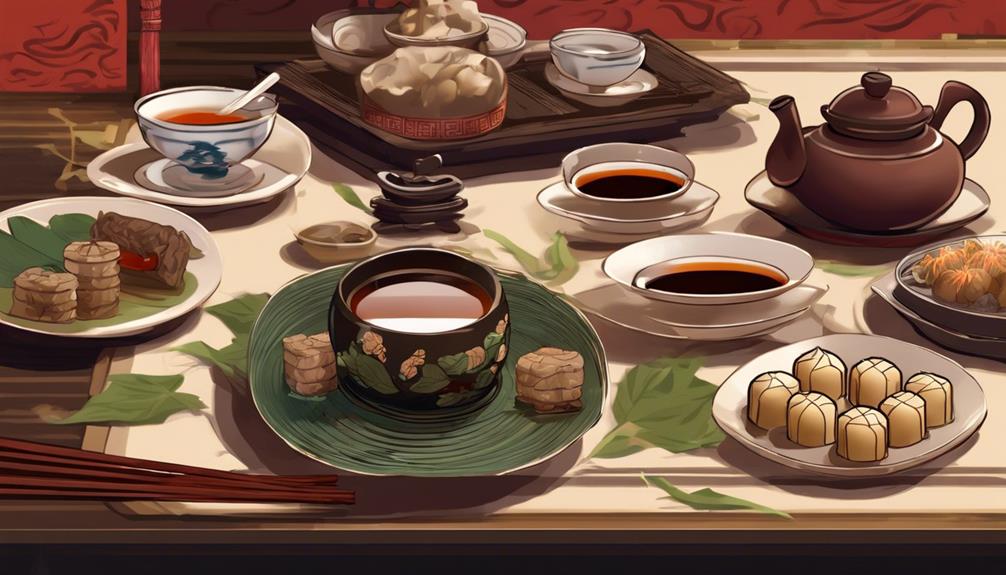
Pu-erh tea, a fermented variety with a rich earthy flavor, is a unique and popular choice among patrons of Chinese restaurants. When enjoying Pu-erh tea at a Chinese restaurant, you may notice its distinctive aroma and deep taste derived from the fermentation process. This tea is often served during traditional tea ceremonies, adding a touch of cultural authenticity to your dining experience.
Aside from its bold flavor, Pu-erh tea is also known for its potential health benefits. Some studies suggest that Pu-erh tea may aid in digestion and weight management, making it a favorable choice for those looking to improve their overall well-being. Additionally, Pu-erh tea is believed to contain antioxidants that can help combat free radicals in the body, potentially boosting your immune system.
Next time you visit a Chinese restaurant, consider trying a cup of Pu-erh tea to not only enhance your meal but also to experience the rich flavors and potential health perks this fermented tea has to offer.
Chrysanthemum Tea

Chrysanthemum tea, a delicate floral infusion, is a popular herbal beverage served at many Chinese restaurants. This light and invigorating tea is not only flavorful but also offers several health benefits. Chrysanthemum tea is rich in antioxidants, which can help boost your immune system and reduce inflammation. It is also believed to promote heart health and aid in digestion.
To fully enjoy the flavors and benefits of chrysanthemum tea, it's crucial to brew it correctly. Here are some brewing techniques to help you make the perfect cup:
| Brewing Techniques | Instructions | Tips |
|---|---|---|
| Water Temperature | Use hot water, not boiling | Boiling water can make the tea bitter |
| Steep Time | 3-5 minutes | Longer steeping can make the tea too strong |
| Serving | Hot or cold | Add ice for a invigorating cold drink |
Try incorporating chrysanthemum tea into your routine for a soothing and beneficial beverage experience.
Herbal Tea Blends
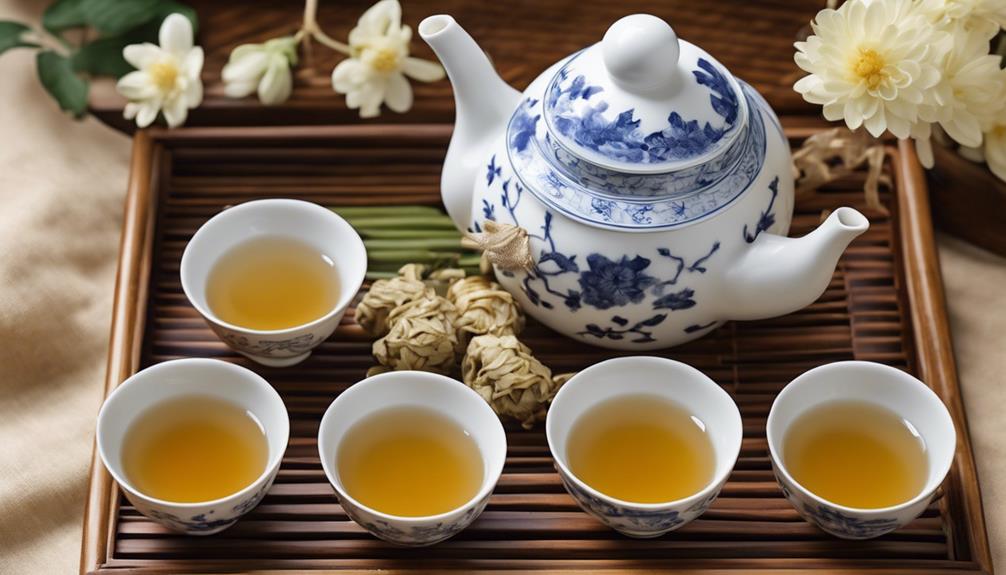
Exploring the diverse world of herbal tea blends can introduce you to a range of unique flavors and health benefits. Herbal tea blends aren't only delicious but also offer various health benefits. Popular flavors in herbal tea blends include soothing chamomile, invigorating peppermint, and spicy ginger.
One of the key attractions of herbal tea blends is their numerous health benefits. Chamomile tea, for example, is known for its calming properties that can help with insomnia and anxiety. Peppermint tea is great for digestion and can alleviate bloating and stomach discomfort. Ginger tea is often used to help with nausea and has anti-inflammatory properties.
These herbal blends aren't only tasty but can also be a natural way to address some common health concerns.
Black Tea

When enjoying a meal at a Chinese restaurant, black tea is a popular choice that offers a robust flavor profile and potential health benefits. Black tea, known for its bold taste and rich color, is also packed with antioxidants that can help improve heart health, boost metabolism, and even reduce the risk of certain cancers. Some popular black tea brands you might encounter at Chinese restaurants include Lipton, Twinings, and Taylors of Harrogate.
To help you better understand the world of black tea, here is a table outlining some of its benefits and a few well-known brands:
| Benefits of Black Tea | Popular Black Tea Brands | Other Information |
|---|---|---|
| Rich in Antioxidants | Lipton | Known for its bold flavor |
| Heart Health Support | Twinings | Offers a variety of blends |
| Metabolism Boost | Taylors of Harrogate | Often served with or without milk |
Conclusion
Next time you dine at a Chinese restaurant, be sure to explore their tea offerings. From the antioxidant-rich Classic Green Tea to the fragrant Jasmine Tea and robust Black Tea, there's a wide variety to choose from.
Each tea has its own unique flavors and potential health benefits, making it a delightful and invigorating addition to your dining experience.
So sit back, relax, and enjoy a cup of traditional Chinese tea with your meal. Cheers!




